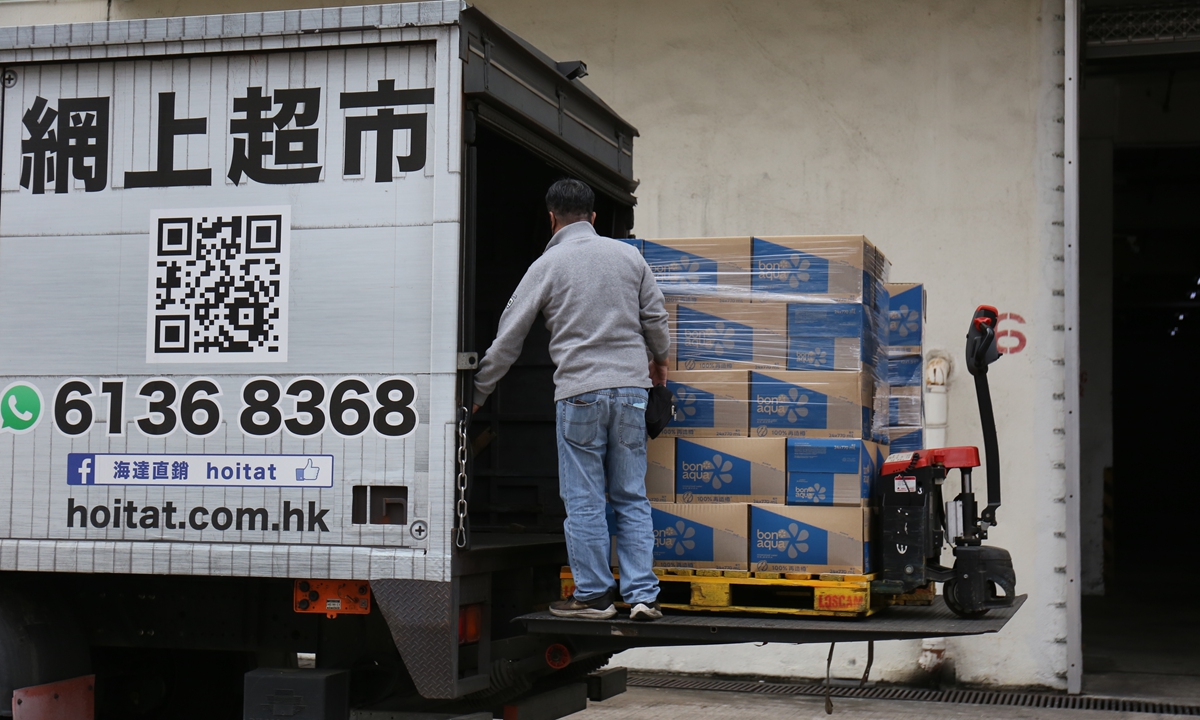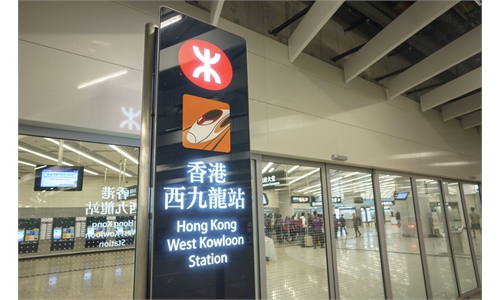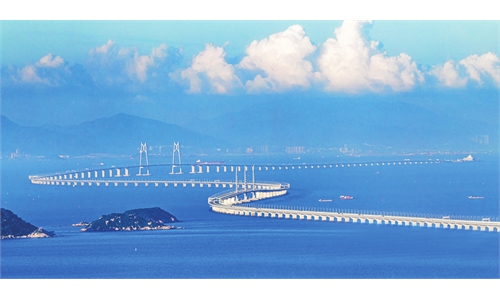
A worker unloads boxes of goods from a truck in Hong Kong on January 12, 2023, as local business gears up to resume exchanges with mainland after borders were reopened on January 8. Photo: Zhao Yusha/Global Times
For business in Hong Kong, the reopening of border with the Chinese mainland could not only mean a fresh start for which they are gearing up and preparing for, but also a return to the mainland's profitable market and a catch up with research and development that had almost entirely stagnated for the last three years. The new start also means the transformation and upgrading of businesses to find new ways of regaining their "wolf nature."
"I had mixed feelings of familiarity and strangeness when I heard of the border reopening between Hong Kong and the mainland. After all I haven't traveled to the mainland in three years," Adran Chong, owner of Soap Studio, a creative design and production company in Hong Kong, told the Global Times on Wednesday.
Chong's company has many production factories located in the mainland. He said that over the last three years, when borders were largely closed between the mainland and Hong Kong, he was accustomed to communicating with his mainland partners online.
"But it's very time-consuming… Some things just cannot be done via screen. The screen cannot show the actual color of our products, and sending samples back and forth would take more than a month, thus the company spent more on shipping and other things," said Chong.
Borders between the mainland and Hong Kong were reopened on January 8, with daily cap of travellers set at around 60,000 travelers from Hong Kong to the mainland, and a similar quota was imposed on travelers from the mainland. Quarantine rules were also scrapped.
Some 300 representatives from the Guangdong toy industry departed for Hong Kong for the HK Toys & Games Fair from the Shenzhen Bay Port on January 7, marking the first delegation to attend an exhibition following the border reopening.
Chong said the border reopening is significant as "many businesses in Hong Kong cooperate with mainland factories." He said the reopening is certainly a "new start" and is planning to travel to the mainland soon after the Chinese New Year, which falls on January 22 this year. "Meeting face to face is so different from the coldness of meeting via screen, even talk over a cup of hot tea with my factory partners is different," Chong said.
Similar joy is also expressed by Harry Yip, a distributor of liquor and drink in Hong Kong. He told the Global Times that the pandemic halved his business over the last three years, as tourist numbers in this city has plummeted.
Mainland tourists were the biggest group of Hong Kong's visitors in previous years. In 2018, 78 percent of the 65 million who visited Hong Kong were from the mainland. Yet from January to November 2022, slightly more than 307,000 tourists came from the mainland, according to official statistics.
Yip said he is gearing up to increase his liquor stock after the border reopening and approaching Chinese New Year holiday period, after which a large influx of tourists from the mainland will be expected in Hong Kong.
He is also planning to visit business partners in Yunnan, Qingdao, and Guangzhou as travel between both sides has been made easier.
In an exclusive interview with the Global Times, Paul Chan Mo-po, the city's Financial Secretary, said that border reopening has injected the city with much needed positivity and this move is going to propel the rapid recovery of Hong Kong's economy. Travel has been made easy for people from both the mainland and Hong Kong, so business trips can resume. Also the tourism and retail industries will greatly benefit from the border reopening, said Chan.
A fresh start
However, Chong also expressed fresh concerns despite borders having reopened. He said that he felt held back in the last three years with regard to research and development. "I would definitely have learned a lot of new things if I could have been in the factory all along."
"In the last three years, many of Hong Kong's industries, be it food or the import-export sector stagnated," Michael Li, vice honorary secretary of the Hong Kong Chinese Importers' & Exporters' Association, told the Global Times. Hong Kong has a relatively small market, and the last three years' lack of exchanges with the mainland saw many Hong Kong businesses lagging behind.
"We didn't know what new things they [mainland businesses] were selling…and we couldn't go back to the mainland to do research and development, which was quite the headache," said Li, noting that the mainland market, however, was still growing and even saw a robust growth of domestic brands.
"Frankly, I think some Hong Kong business gradually lost their edge, especially compared with their peers in the mainland, with regard to their ability to conduct research and development, and in terms of financial support," said Li, noting that the border reopening, however, could be a fresh start for Hong Kong businesses to regain their "wolf nature" of competitiveness.
The next step, according to Li, could be for Hong Kong's business to organize their brand equity and other potentials, and better integrate with the mainland market.
In an interview with the Global Times on Tuesday, Hong Kong lawmaker Wendy Hong Wen said that three years of border closure have made Hong Kong rethink its future as many things have since changed, and a new way must be found. This is a good time for Hong Kong to rethink a long-term development path through this reconstruction.
Scientific and technological innovation, the cultural creative industry, industries closely related to the digital economy, and manufacturing that combines with artificial intelligence - these are four future directions for Hong Kong on the path to seeking transformation and an industrial upgrade which allows the participation of all of the city's talent, Hong contends.
The Hong Kong Special Administrative Region (HKSAR) government will also lead investment in strategic industries and further make good use of fiscal reserves to promote industrial and economic development.
"The SAR government is willing to shoulder its responsibility and make up for the defects in the market through a moderate combination of the market as facts from the last few years have proven that simply relying on the market doesn't work, so I think it is quite a big breakthrough."
According to Bloomberg, economists are upgrading their forecasts for Hong Kong this year as the city accelerates its reopening with the Chinese mainland and the rest of the world. The median estimate in a Bloomberg survey by 12 economists last week was a forecast of 3.3 percent growth for 2023, higher than the initial 2.7 percent forecast in a survey by 25 economists in November.



